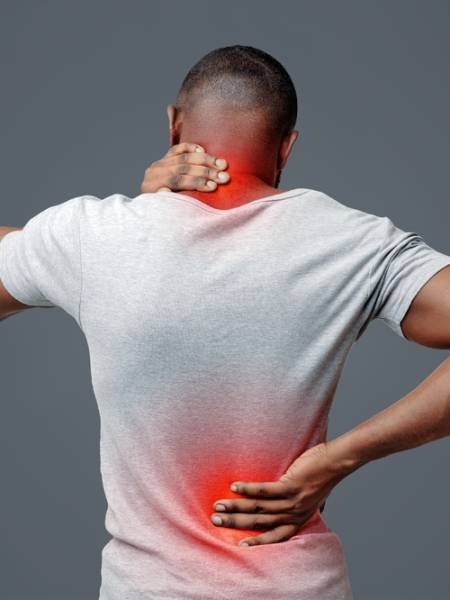Back Pain
Back pain is one of the most common and disruptive conditions, often making it difficult to sit, stand, or perform everyday tasks. Because the back is a complex structure made up of muscles, bones, nerves, and connective tissues, effective treatment frequently requires specialized care beyond that of a general physician.
At Cellara Pain Institute, our expert pain management physicians are dedicated to diagnosing the underlying cause of your pain and providing personalized, long-lasting relief. We offer advanced treatment solutions designed to restore comfort and improve your quality of life.

Symptoms of Back Pain
Back pain can significantly disrupt daily movement and function. It may range from a mild muscle ache to sharp, burning, or stabbing sensations. In some cases, pain radiates down the legs or to other areas of the body when nerves are affected. Common activities such as bending, twisting, lifting, standing, or walking can worsen symptoms and make the condition more difficult to manage.
When Should You Seek Medical Assitance For Back Pain?
While most cases of general back pain are not life-threatening, they can be extremely uncomfortable and may indicate a more serious underlying condition. It is important to seek prompt medical evaluation if back pain is accompanied by any of the following symptoms:
Unexplained weight loss
Fever
Inflammation or visible swelling in the back
Persistent pain that does not improve with rest or lying down
Pain radiating down the legs
Pain that extends below the knees
Recent trauma, injury, or impact to the back
Difficulty urinating or urinary incontinence
Loss of bowel control (fecal incontinence)
Numbness around the genitals, anus, or buttocks
What Causes Back Pain?

Back pain can affect anyone—including children and teens—and is most often the result of strain, tension, or injury. Some of the most common causes include:
Strained muscles or ligaments
Muscle spasms
Muscle tension
Damaged or herniated discs
Injuries, fractures, or falls
Injuries to the back can result in torn or overexerted muscles and soft tissues, often leading to lasting pain and discomfort. In more severe conditions such as Degenerative Disc Disease, the cushioning between the vertebrae deteriorates over time. As a result, the discs may painfully interact during movement, reducing spinal flexibility. In some cases, bone spurs may develop and press on nerve roots, causing pain, inflammation, or even muscle weakness.
Back pain is one of the leading reasons patients seek emergency medical care. According to research from the Mayo Clinic and the National Institutes of Health, approximately 80% of people will experience lower back pain at some point in their lives. While some individuals feel immediate pain following a known injury or strain, others may develop symptoms gradually without a clear cause.
Other Conditions That Affect Your Back and Can Cause Discomfort Are:
- Tailbone Pain (Coccydynia)
- Compression Fractures of the Spine
- Degenerative Disc Disease
- Discogenic Pain
- Herniated Disc
- Lumbar Radiculopathy (Sciatica)
- Osteoarthritis of the Spine
- Post-Laminectomy Syndrome
- Sacroiliac Joint Pain
- Scoliosis
- Spinal Stenosis
- Spondylolysis
- Post Surgical Pain
Contributing Factors
Risk Factors for Back Pain
A variety of medical, occupational, and lifestyle factors can increase the risk of developing back pain. Certain health conditions—such as obesity, diabetes, blood clotting disorders, and nerve-related illnesses—are known to contribute to or exacerbate back pain.
Workplace and Lifestyle Contributors
Job-related stress can lead to muscle tension, which may contribute to chronic pain. Occupations that involve heavy lifting, frequent pushing or pulling, or repetitive twisting motions place individuals at greater risk for back injuries—especially when proper body mechanics are not used. Even desk jobs can be problematic, particularly when poor posture or an unsupportive chair is involved.
Impact of Sedentary Behavior
A sedentary lifestyle also raises the risk of back pain. Lack of regular physical activity weakens the core and back muscles, making the body more vulnerable to strain and injury.
Age-Related Factors
As people age, they are more likely to develop conditions that cause chronic pain and mobility issues. According to the Centers for Disease Control and Prevention (CDC), adults aged 65 and older are especially prone to pain in the back, arms, wrists, and hands. Untreated or progressively worsening conditions may lead to pain levels that no longer respond to standard over-the-counter medications, requiring more advanced intervention.
Back Pain at Cellara Pain Institute
Living with chronic pain can take a toll on your daily life and overall well-being. At Cellara Pain Institute, our team of Harvard-trained physicians proudly offers state-of-the-art pain management solutions throughout Pennsylvania—bringing expert care just minutes from your home.
We are pleased to provide advanced pain relief services in Madison, NJ 07940. Whether you’re experiencing pain in the arms, legs, head, back, pelvis, or other areas, our specialists are here to help.
At Cellara Pain Institute, patient comfort and transparency are at the heart of everything we do. Our team will guide you through a personalized care plan using a wide range of evidence-based treatments designed to meet your unique needs.
Call 973-377-6700 to schedule your appointment and take the first step toward lasting relief.
